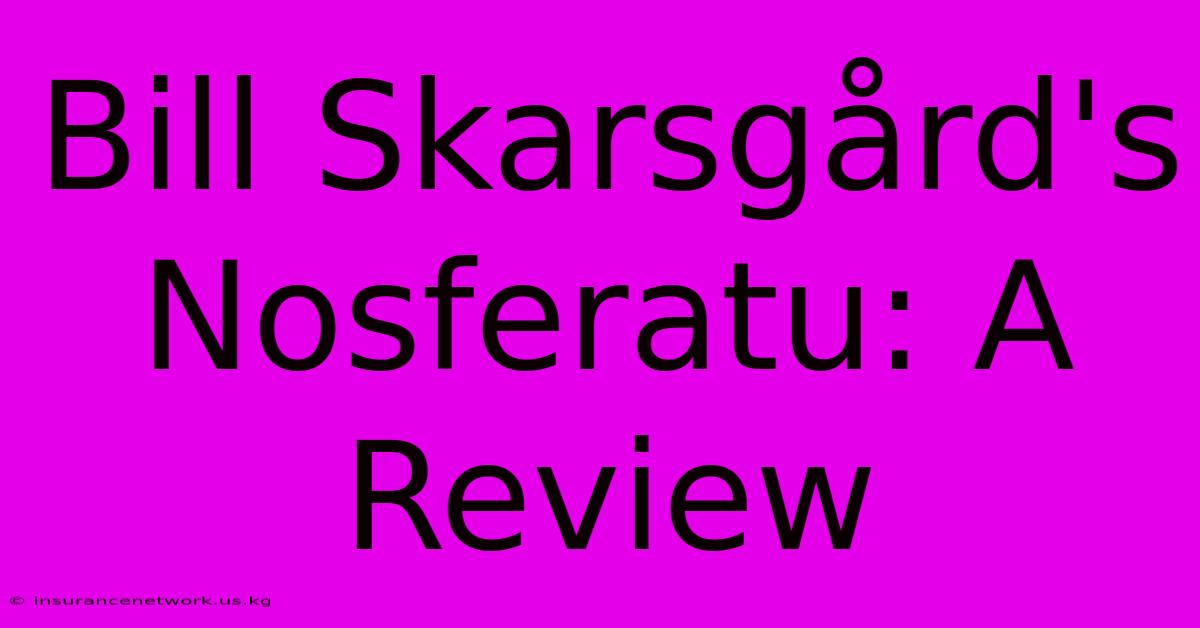Bill Skarsgård's Nosferatu: A Review

Discover more detailed and exciting information on our website. Click the link below to start your adventure: Visit Best Website insurancenetwork.us.kg. Don't miss out!
Table of Contents
Bill Skarsgård's Nosferatu: A Review – A Fresh Bite on a Classic
Robert Eggers’ upcoming film, Nosferatu, starring Bill Skarsgård as the titular Count, has generated considerable buzz. While details remain scarce, the anticipation is palpable. This review will explore what we know so far, speculate on potential interpretations, and consider how Skarsgård's casting might revitalize this iconic vampire tale.
A Legacy of Shadows: The Nosferatu Mythos
Bram Stoker's Dracula casts a long shadow, inspiring countless adaptations. F.W. Murnau's 1922 silent film, Nosferatu, eine Symphonie des Grauens, is arguably the most influential, offering a uniquely unsettling vision of the vampire myth. Its stark imagery, expressionistic cinematography, and Max Schreck's unforgettable performance cemented Nosferatu’s place in cinematic history. However, the film's unauthorized adaptation of Stoker's novel resulted in its near-total destruction for many years. Now, the legend lives on, and Eggers' adaptation promises a new chapter in the Nosferatu saga.
Why Bill Skarsgård? A Perfect Casting Choice?
Casting Bill Skarsgård as Count Orlok is a bold and intriguing choice. Known for his chilling portrayal of Pennywise in the IT adaptations, Skarsgård possesses an unnerving intensity that perfectly aligns with the character's unsettling nature. He can portray both vulnerability and monstrousness with equal skill, promising a nuanced and layered performance that moves beyond simple caricature. His ability to convey quiet menace is particularly fitting for a character whose power lies in subtle manipulation and unnerving presence.
Eggers' Vision: More Than Just a Remake
Robert Eggers is no stranger to crafting visually stunning and thematically rich horror films. The Witch and The Lighthouse demonstrate his mastery of atmosphere, suspense, and period detail. His approach to Nosferatu is expected to be equally meticulous, prioritizing historical accuracy and thematic depth over gratuitous gore. We can anticipate a film that delves into the psychological aspects of vampirism, exploring the Count's isolation, his parasitic nature, and the societal anxieties reflected in his monstrous form. This promises a Nosferatu that is not merely a remake, but a reimagining that speaks to contemporary anxieties while honoring the source material's legacy.
Speculation and Anticipation: What to Expect
While plot details are under wraps, it's reasonable to expect a faithful adaptation of the core narrative, possibly incorporating elements from Murnau's silent film and Stoker's novel. The focus will likely remain on the Count's journey to Wisborg, the devastating impact on the town, and the desperate attempts to defeat him. Eggers’ signature style suggests that the film will be visually arresting, utilizing atmospheric lighting, unsettling sound design, and meticulously crafted sets to create a truly immersive experience. The use of practical effects and minimal CGI is also likely, further enhancing the film's tactile and visceral impact.
Conclusion: A New Era of Nosferatu?
Bill Skarsgård's Nosferatu, directed by Robert Eggers, has the potential to be a landmark achievement in horror cinema. It's not just a simple retelling of a classic tale; it's a bold reimagining that promises to explore the enduring power of the vampire myth in a fresh and unsettling way. While we eagerly await the film's release, the early signs are incredibly promising. The combination of Skarsgård's talent and Eggers' visionary direction suggests a Nosferatu for the ages – a film that will both satisfy long-time fans and introduce a new generation to the enduring terror of the Count. The anticipation is real, and the wait will hopefully be worth it.

Thank you for visiting our website wich cover about Bill Skarsgård's Nosferatu: A Review. We hope the information provided has been useful to you. Feel free to contact us if you have any questions or need further assistance. See you next time and dont miss to bookmark.
Featured Posts
-
Why Taylor Missed Kelces Game
Dec 26, 2024
-
Why Taylor Missed Chiefs Steelers Game
Dec 26, 2024
-
Doncic Injured Mavs Playoff Hopes
Dec 26, 2024
-
Death Of Mexican Singer Dulce
Dec 26, 2024
-
10 Stats Ravens Vs Texans Week 17
Dec 26, 2024
